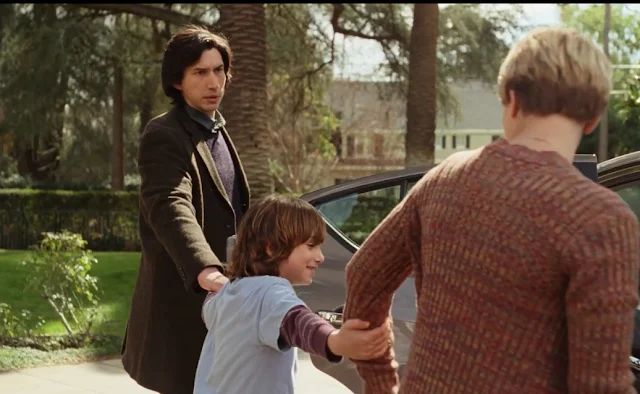 |
Emma Watson, Saoirse Ronan, Florence Pugh, and Eliza Scanlen in Little Women
|
Cast: Saoirse Ronan, Emma Watson, Florence Pugh, Eliza Scanlen, Laura Dern, Timothée Chalamet, Meryl Streep, Tracy Letts, Bob Odenkirk, James Norton, Chris Cooper, Louis Garrel, Jayne Houdyshell.
Screenplay: Greta Gerwig,
based on a novel by Louisa May Alcott.
Cinematography: Yorick Le Saux.
Production design: Jess Gonchor.
Film editing: Nick Houy.
Music: Alexandre Desplat.
I didn't read Little Women as a child: Boys didn't read "girls' books" back then. And when I finally read it -- out loud, to my daughter -- I found it a little stiff and starchy. But it has made for some very good movies, particularly the 1933 Katharine Hepburn version directed by George Cukor and the 1994 Winona Ryder version directed by Gillian Armstrong. Somehow, I don't think we'll be calling this 2019 film the Soirse Ronan version, but rather the Greta Gerwig version. As writer and director, Gerwig has developed a complete and insightful view of the Louisa May Alcott novel, one that takes into account what was always present in the novel but brings it into the light of the 21st century: the changes in the roles and attitudes of women. By rearranging the chronology of the novel and structuring it around the development of Jo March (Ronan) as a writer, Gerwig has accomplished two things: She has allowed the other March sisters to share the spotlight that Jo hogged when she was played by Hepburn and Ryder. She has also revealed the rather sentimental endings of the other films as what they were: contrivances designed to please moviegoers, as they did readers, more than to reflect actual life. By establishing in the film that Jo is accommodating the desire of her publisher (Tracy Letts) that the heroine of her Little Women not remain a spinster, Gerwig is able to go a little bit over the top in the film, bringing back Prof. Bhaer (Louis Garrel), with whom Jo broke off over his criticisms of her writing, for a giddy reunion and wedding to Jo. This is all staged with the kind of unabashed sentimentality, including a glimpse of Jo's very improbable school, in which all the sisters and their husbands are the instructors and the curriculum includes fencing, that can't be taken with a straight face. We are meant to sense that the real Jo March might well have remained a spinster rather than capitulate to, as she puts it in the movie, "people saying that love is just all that women are fit for." It's also an ending that wouldn't have worked if Gerwig and her performers hadn't created characters that have a little more body than the source gives them: Timothée Chalamet's Laurie isn't just the slightly odd young man he is in the book (and in the performances of Douglass Montgomery and Christian Bale in the earlier versions), but rather spoiled, dilettantish, and probably alcoholic. Florence Pugh deserved the Oscar nomination she got for bringing more than just flightiness to the character of Amy. Even Beth (Eliza Scanlen) in this version is more than just the saintly innocent who dies young, and we have Gerwig's script and direction for allowing them to blossom rather than being overwhelmed by Jo, good as Ronan's performance is. I can't quite subscribe to Anthony Lane's comment that her Little Women "may just be the best film yet made by an American woman," which hardly seems fair to the work of directors from Dorothy Arzner to Ida Lupino to Kathryn Bigelow and Kelly Reichardt, but it's certainly a provocative and sometimes audacious triumph.














